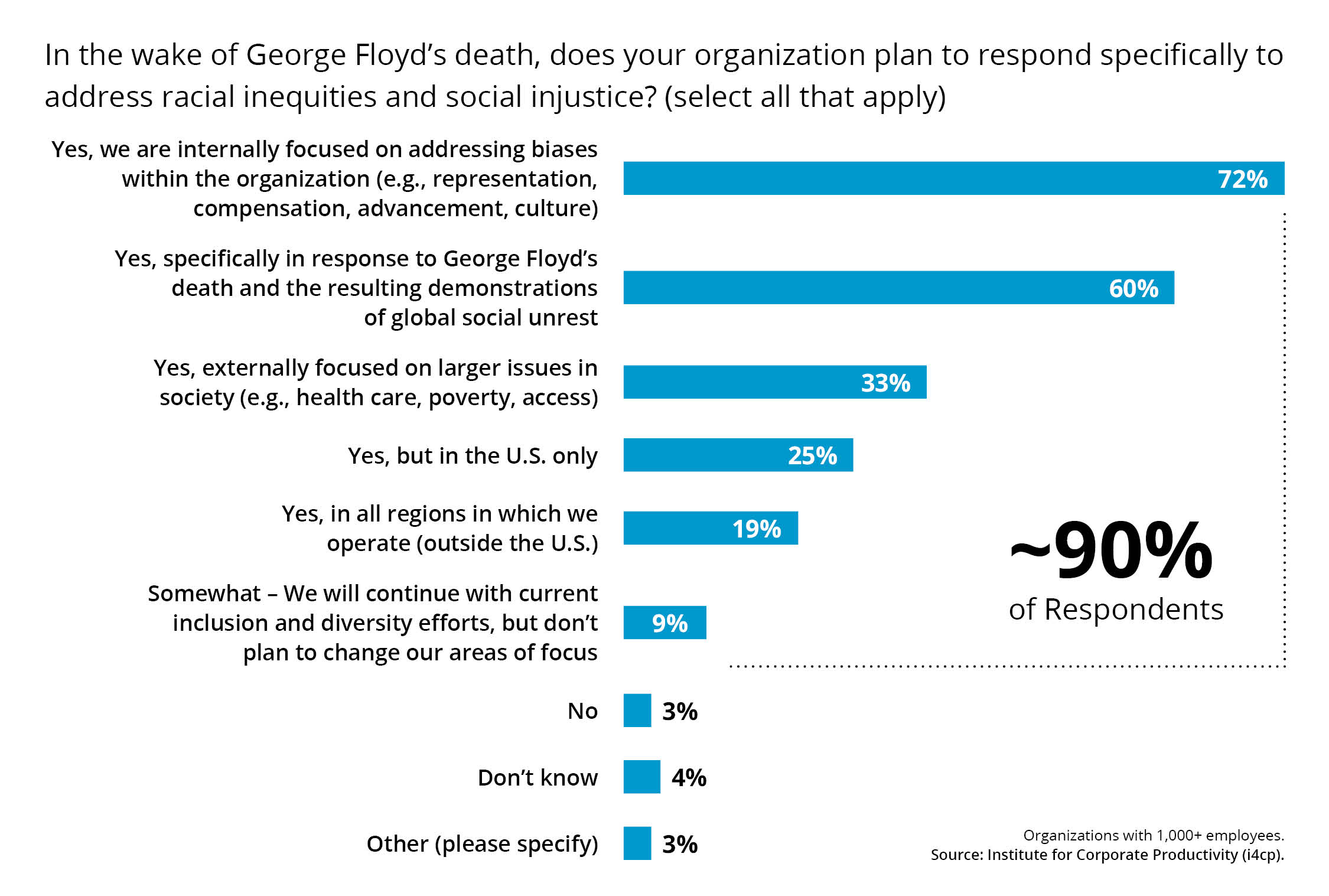Nearly 90% of Organizations Report Expanding Racial Equity Efforts

While George Floyd’s name will be forever tied to the social unrest currently sparked around the globe, countless names have come before, innumerable systemic social inequities have risen to the surface due to COVID-19, and dozens of similar incidents continue to highlight the need for lasting change.
This is not the first time we’ve been here, but many long-time social justice activists believe that this time is different.
Calls for sweeping political and institutional reforms are swiftly being address by some state and local governments—and corporations are increasingly responding to calls from their employees and customers to be long-term partners in finding solutions.
In a pulse survey fielded this week by the Institute for Corporate Productivity (i4cp), almost 90% of respondents representing larger companies (those that employ >1,000 people) reported that their organizations are taking some type of action in response to the death of George Floyd, even if that action is a continuation of current I&D efforts.
Further, 60% said that their organizations are taking action specifically in response to the murder of George Floyd and the resulting social unrest. Of those expanding their efforts, 72% are looking internally to address biases within their organizations, while 33% are also focusing externally to help address systemic problems in society.

Companies that are focused internally are doing so in a variety of ways. More broadly focused or in-the-moment efforts include reaffirming their inclusive values (78%), combining efforts to support all groups that face discrimination (44%), and/or bringing in consultants to lead discussions about race (26%).
Efforts that more directly create change include increased anti-racism and anti-bias training for leaders and managers (52%), providing additional resources or assistance to impacted employees (29%), and/or conducting bias audits of existing norms and practices (22%).

Many survey respondents reported that their organizations are equally committed to action but are currently in a listening-phase before determining what actions to take. These firms are sponsoring employee-led listening sessions (65%), forming a standing action team that will address the issues and propose actions (49%), tapping into ERG/BRGs to help develop action plans (46%), or are otherwise in the process of deciding where to focus their efforts (23%).
External actions that employers are taking to address social inequities and racial justice in the long-term are less prevalent, but have been extremely visible and important in shaping public perceptions. The most common external action is donations to organizations focused on racial justice – some of which have made headlines —cited by 43% of respondents.
Others are combining efforts through partnerships, either in the communities where they operate (36%) or with third-party organizations that focus on racial justice (28%). Only 8% reported looking at or changing political donations or lobbying activities.
Where applicable, 26% reported working to ensure equal access or enhance business offerings or services to underrepresented communities. This is crucial in addressing systemic racism, as access to financial services, housing, healthcare, employment, business resources, and education have been fundamental obstacles for black and brown communities.
Beyond their internal offerings, 20% of organizations are starting or increasing funding for supplier diversity programs, while 15% are requiring greater supplier diversity from their partners.
While almost half of organizations don’t have a specific element of systemic racism that they plan to address, the top six reported are:
- Employment (31%)
- Education disparities (23%)
- Healthcare access (21%)
- Income gap (13%)
- Racial profiling (12%)
- Housing discrimination (7%)
Others cited industry or field specific representation, public health disparities (beyond access), food insecurity, and financial literacy.
The struggle for racial justice in the U.S. and abroad has a long, convoluted, and often stagnant history marked by major social upheavals like the one we are in now. To make this moment one that creates lasting change to our societal underpinnings takes commitment, determination, and a rejection of the inevitable backlashes we’ve seen in the past. With forward-thinking companies putting their cultures to the test like never before, lasting change is possible. So, what is your organization doing to be part of the solution?





